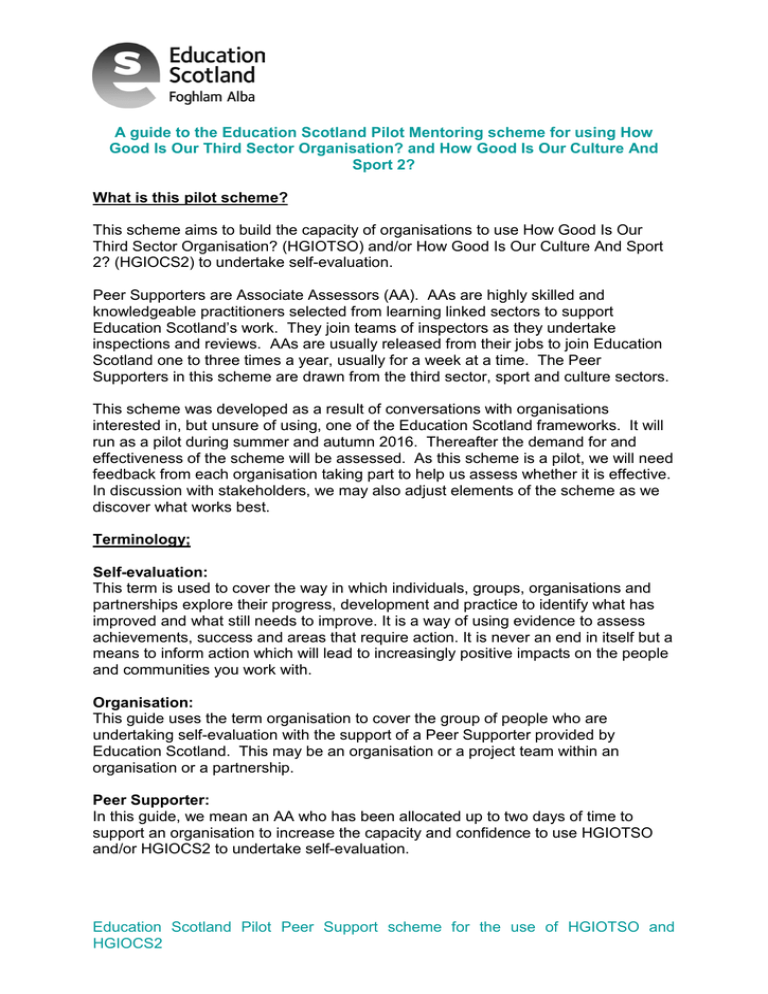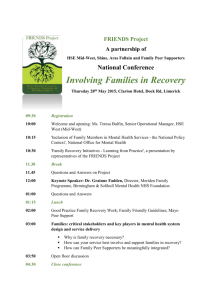A guide to the Education Scotland Pilot Mentoring scheme for... Good Is Our Third Sector Organisation? and How Good Is...
advertisement

A guide to the Education Scotland Pilot Mentoring scheme for using How Good Is Our Third Sector Organisation? and How Good Is Our Culture And Sport 2? What is this pilot scheme? This scheme aims to build the capacity of organisations to use How Good Is Our Third Sector Organisation? (HGIOTSO) and/or How Good Is Our Culture And Sport 2? (HGIOCS2) to undertake self-evaluation. Peer Supporters are Associate Assessors (AA). AAs are highly skilled and knowledgeable practitioners selected from learning linked sectors to support Education Scotland’s work. They join teams of inspectors as they undertake inspections and reviews. AAs are usually released from their jobs to join Education Scotland one to three times a year, usually for a week at a time. The Peer Supporters in this scheme are drawn from the third sector, sport and culture sectors. This scheme was developed as a result of conversations with organisations interested in, but unsure of using, one of the Education Scotland frameworks. It will run as a pilot during summer and autumn 2016. Thereafter the demand for and effectiveness of the scheme will be assessed. As this scheme is a pilot, we will need feedback from each organisation taking part to help us assess whether it is effective. In discussion with stakeholders, we may also adjust elements of the scheme as we discover what works best. Terminology; Self-evaluation: This term is used to cover the way in which individuals, groups, organisations and partnerships explore their progress, development and practice to identify what has improved and what still needs to improve. It is a way of using evidence to assess achievements, success and areas that require action. It is never an end in itself but a means to inform action which will lead to increasingly positive impacts on the people and communities you work with. Organisation: This guide uses the term organisation to cover the group of people who are undertaking self-evaluation with the support of a Peer Supporter provided by Education Scotland. This may be an organisation or a project team within an organisation or a partnership. Peer Supporter: In this guide, we mean an AA who has been allocated up to two days of time to support an organisation to increase the capacity and confidence to use HGIOTSO and/or HGIOCS2 to undertake self-evaluation. Education Scotland Pilot Peer Support scheme for the use of HGIOTSO and HGIOCS2 What can Peer Supporters provide? Peer supporters will support you to undertake self-evaluation using HGIOTSO and/or HGIOCS2. They aim to help you to build your organisation’s capacity to identify your strengths, your areas for development and consider your next steps. All peer supporters are experienced, skilled individuals who understand self-evaluation and the frameworks Education Scotland produces to support self-evaluation. They will share their knowledge and support you to build your confidence to self-evaluate using these frameworks. They can also support you through informal one off coaching. For example if your organisation is new to running focus groups and you decide that this is a key feature for the type of self-evaluation you need to undertake your mentor could share their knowledge on this. They could also work alongside a member of your team to support them to run their first focus group and then give them constructive feedback afterwards. Organisations should consider carefully what they want the Peer Supporter to support them with prior to applying. We anticipate that most organisations applying for a mentor will want one or more of the following: • Knowledge from an experienced practitioner • Support from a fellow practitioner to improve skills and confidence • Peer support and challenge • A critical friend • A role model • Challenge to grow self-evaluation resourcefulness and creativity They may want knowledge on specific self-evaluation topics such as: • introducing self-evaluation and/or the frameworks to staff, volunteers, boards • running a focus group • using the frameworks to identify good practice • identifying which quality indicators to use identifying what you want to find out – being specific and SMART in your self-evaluation plans • identifying and recording evidence As part of the Education Scotland team, peer supporters work to ensure: equality and diversity, transparency and mutual respect, strong partnership working, improvement and capacity building and best value. Peer Supporters respect data protection, maintaining the confidentiality of sensitive material such as information about individual clients or particpants of an organisation. They follow Education Scotland’s safeguarding policy. What do peer supporters not cover? Through this scheme the peer supporter allocated to your organisation will help you to undertake self-evaluation using HGIOTSO and/or HGIOCS2. They will not Education Scotland Pilot Peer Support scheme for the use of HGIOTSO and HGIOCS2 undertake self-evaluation for you. Peer supporters can provide knowledge, information, informal coaching and support but they will not, for example, run meetings or write self-evaluation reports for you. Whilst all peer supporters have a strong understanding of the frameworks they use regularly, they will not be familiar with every aspect of every framework. They will however be helpful in you sourcing relevant information and knowledge where they cannot directly help. Peer supporters have their own post in sports, cultural or third sector organisations. It is important that the organisation they are allocated to recognise this and respect the time limits and contact availability that each mentor has. Peer supporters will not work beyond their allocated day/s. Responsibility of Organisations gaining a Peer Supporters under this pilot scheme It is the responsibility of the organisation applying for peer support to ensure that Peer Supporters are working in safe environments whilst they are acting as Peer Supporters. Education Scotland Pilot Peer Support scheme for the use of HGIOTSO and HGIOCS2 Steps once an organisation has applied for a Peer Supporter 1. The application will be assessed by Education Scotland staff to see whether it is appropriate for the pilot scheme. They will also look at whether we have an available Peer Supporter. Please note this pilot scheme is small in scale and so it may not always be possible to match up a peer supporter with an organisation regardless of the quality of the application. 2. Education Scotland will email the lead contact of the organisation making the application to let them know whether they have been successful. Where organisations have been unsuccessful, the email will briefly explain why. 3. Where an application has been successful, a member of Education Scotland staff will email to confirm this and to set up a time for an initial phone call between Education Scotland and the applicant. 4. The Initial Phone Call will: • • • • Explore the bid in a little more detail; what does the organisation need support with, is this realistic given the resource available from Education Scotland. Confirm the role of a Peer Supporter. Discuss provisional timelines for ; when the organisation will hear who they have been matched with, the start of the support, use of the time of the Peer Supporter, for the support to be finished and feedback to be given to Education Scotland. This call should last no more than 20 minutes. 5. Following this call Education Scotland will match up the organisation with a Peer Supporter and provide both the Peer Supporter and the lead worker for the organisation with each other’s names and contact details. 6. The Peer Supporter will then get in touch with the organisation and arrange a time for a Scoping Conversation. This conversation will usually be by phone but may be by others means such as video conference, Skype for Business or in person. 7. This Scoping Conversation will cover: • Introductions • Confirming what the organisation seeks to get from the peer support including what and whose capacity they wish to build • Timescales and the initial stages of planning when, where and with who the peer support will take place • Discuss which framework/s and which parts (Quality Indicator / Theme / Challenge Questions) of the framework/s the organisation wants to use. • Agreed the role of the Peer Supporter and how their time will be used, taking account of preparation and travel time. Education Scotland Pilot Peer Support scheme for the use of HGIOTSO and HGIOCS2 8. The peer support commences. 9. The peer support completes and feedback is given by both the organisation and the peer supporter to Education Scotland. For more information, contact us at HGIOTSO@educationscotland.gsi.gov.uk Education Scotland Pilot Peer Support scheme for the use of HGIOTSO and HGIOCS2



